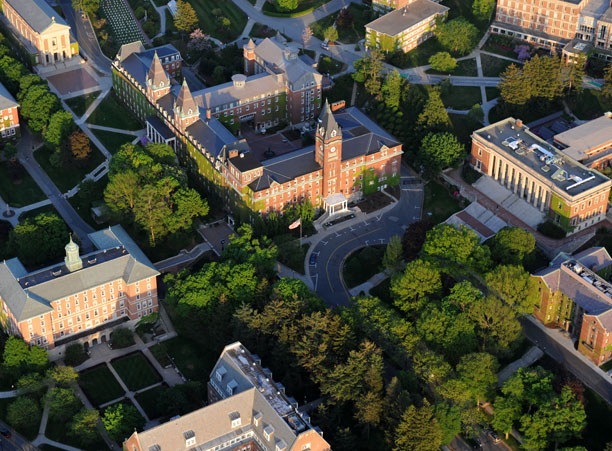A new multi-campus partnership involving some of Worcester’s leading colleges will boost efforts to save energy and reduce carbon emissions through innovative technical, financial, and human solutions. Clark University, the College of the Holy Cross, and Worcester Polytechnic Institute have partnered with National Grid and GreenerU in establishing “SynergE Worcester,” an initiative that will facilitate significant energy efficiency and other sustainability advances within the regional higher education community.
SynergE Worcester involves a multi-pronged approach designed to reduce energy use and enhance existing sustainability programs on the three, highly respected campuses through collaboration with each other, National Grid and its energy efficiency incentives, and GreenerU’s energy and sustainability expertise. The program will target energy efficiency installations that reduce fuel and utility costs for the schools; engage students, faculty, and staff in energy and sustainability initiatives; and utilize innovative financing to bring about reductions in energy consumption and greenhouse gas emissions.
“National Grid has a long history of working with the city of Worcester and its colleges and universities from our work with implementing our award-winning energy efficiency programs to our proposed Smart Grid program, which includes our 2011 Green2Growth community summit,” said Marcy Reed, president of National Grid in Massachusetts. "We’re delighted to support this SynergE initiative, which is a natural extension of our mission to deliver innovative energy solutions that empower our customers to maximize potential energy savings, while protecting the environment.”
“We are pleased to collaborate with Holy Cross, WPI, National Grid and GreenerU on this innovative sustainability initiative,” stated Clark University President David Angel. “Clark and its students are not only enthusiastic about laying out a sustainability vision for the University, but in bringing about real improvements on our campus that will significantly reduce our energy use and carbon emissions.”
College of the Holy Cross President Rev. Philip L. Boroughs, S.J., commented that, “In addition to the energy and carbon savings, we are interested in utilizing SynergE Worcester to demonstrate sustainability practices that will engage students, staff, faculty and administration and other stakeholders in ways that lead to both new learning and sustainability advances.”
WPI President Dennis Berkey said, “We believe this initiative will benefit our Institute and our technologically oriented student body through operational, infrastructure, and educational benefits. The specialized incentives and multi-year nature of the program will allow for the flexibility and growth necessary to achieve ambitious goals and demonstrate a model for other institutions.”
The three participating schools have all made significant strides in demonstrating sustainability leadership and implementing innovative solutions on their campuses. Clark University was ranked in the Top 20 “Coolest Schools” by Sierra Magazine and has committed to reach net carbon neutrality by 2030. Holy Cross was a charter signer of the American College & University Presidents’ Climate Commitment in 2007 and has exceeded its goal to reduce carbon emissions by 20 percent by 2015. Worcester Polytechnic Institute earned an A-minus on the 2011 College Sustainability Report Card and features Worcester’s first “living green” roof atop its LEED-certified East Hall.
SynergE Worcester will enable the schools to achieve even more. GreenerU and National Grid will work with the colleges to assist them in maximizing energy savings over the four years of the project. The initiative will focus on buildings that are most likely to yield significant energy savings, and through the use of submetering, existing building commissioning, and innovative financing approaches for larger energy efficiency installations, the colleges hope to attain significant cost savings and a reduction in their carbon emissions.
As a centerpiece of the initiative, the campus community engagement component will seek to involve campus stakeholders in the program to implement solutions and offer learning opportunities for students. A Tri-Campus Sustainability Leadership Council has been established to guide and lead the multi-campus engagement and behavior change component of SynergE Worcester. The Council will bring together sustainability leaders from the three colleges to guide the collaboration, build capacity with an ever-growing network of Worcester sustainability implementers, and share resources and best practices to improve each campus’ sustainability program.
“GreenerU is very pleased to be working with Clark, Holy Cross and WPI on this important energy and sustainability project,” said Rob Pratt, GreenerU’s CEO. “The colleges are committed to making their campuses more energy efficient and sustainable, and National Grid has shown great leadership in supporting the development of the SynergE Worcester initiative. We are also looking forward to working with NSTAR, the utility that provides natural gas to the three schools, in implementing energy saving programs.”
Media Coverage:
- Telegram & Gazette, June 17: College Town
Related Information:



